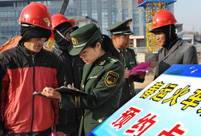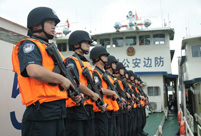XI'AN, Dec. 19 -- China has introduced various emergency responses and long-term measures against air pollution in the central and eastern regions.
The air quality index (AQI) reading for Xi'an, capital of Shaanxi Province, reached 500 on Wednesday afternoon, at the top of the AQI scale and indicating hazardous pollution, according to the national air quality monitoring website.
Smog on Thursday still covered the city and the AQI at noon was 417, making Xi'an the second most polluted city in the region after Xingtai in Hebei Province at 491.
Xi'an weather forecasters predict the smog, which started on Monday, will continue for the next week and air pollution may worsen.
On Wednesday, a city government emergency response plan swung into action, suspending all construction and taking at least 50 percent of government vehicles off the road. Power plants must limit their output and reduce emissions.
"I have to keep buying masks for my family, otherwise we cannot go outside," said Liu, buying a mask at a pharmacy near her home in downtown Xi'an. "This is the only thing we can do to protect ourselves."
Apart from Xi'an and Xingtai, Shijiazhuang and Handan in Hebei and Wuhan in Hubei also had dangerous smog on Thursday, with AQI over 300. AQI in many other cities in east and central China exceeded 200, "heavy" pollution.
This December, nearly half the country, more than 100 cities in 20 provinces, have suffered from smog. Many have taken action, including experimenting with artificial methods to reduce smog, limiting vehicle use and fining polluters.
In Beijing, more than 200 automatic observatories and eight new meteorological radar systems will improve weather forecasting by 2015, vice mayor Lin Keqing said on Tuesday at a conference.
Tianjin Municipality has imposed a quota on new car license plates, requiring residents to obtain plates through auctions or lotteries.
Tianjin also said on Sunday that it would restrict cars depending on the last digit of their plates, echoing Beijing's move of five years ago. The scheme will come into force on March 1 and will take one fifth of the city's private cars off the roads on workdays.
Governments in eight cities in Liaoning Province have been fined a total of 54.2 million yuan (9 million U.S. dollars) for pollution, based on air quality evaluation. In September, the government decided to cut the density of inhalable particulate matter by at least 10 percent in major cities by 2017.
The Organization Department of the Communist Party of China (CPC) Central Committee abandoned assessments based on GDP alone earlier this month and put more emphasis on public well-being and the environment. Whether the move will be effective in forcing local governments consider environmental issues over economic growth remains to be seen. Environment protection professionals are gloomy about the immediacy of the effects of these measures.
Xiao Hang, an urban researcher at the Chinese Academy of Sciences, said it took London 50 years to lose the moniker "foggy London town", and Los Angeles still struggles to contain its photochemical smog.
"We can't ignore environmental problems during the development process and China has a long way to go," he said.
 People prepare for upcoming 'Chunyun'
People prepare for upcoming 'Chunyun'  Highlights of Beijing int'l luxury show
Highlights of Beijing int'l luxury show Record of Chinese expressions in 2013
Record of Chinese expressions in 2013 China's moon rover, lander photograph each other
China's moon rover, lander photograph each other 17th joint patrol of Mekong River to start
17th joint patrol of Mekong River to start Spring City Kunming witnesses snowfall
Spring City Kunming witnesses snowfall Heritage of Jinghu, arts of strings
Heritage of Jinghu, arts of strings Weekly Sports Photos
Weekly Sports Photos PLA elite units unveiled
PLA elite units unveiled  PLA elite units unveiled
PLA elite units unveiled  Chinese scientific expedition team
Chinese scientific expedition team  Heritage of Jinghu, arts of strings
Heritage of Jinghu, arts of strings The unchanged flavor of changing Beijing
The unchanged flavor of changing Beijing Miss Philippines crowned Miss International
Miss Philippines crowned Miss International Bolt throws down bus challenge in China
Bolt throws down bus challenge in ChinaDay|Week|Month